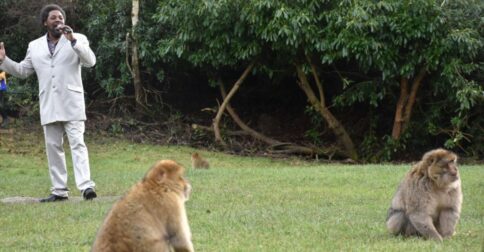
This past weekend, monkeys residing at a British zoo got a special treat. A Marvin Gaye impersonator performed “Let’s Get It On” and “Sexual Healing,” all in an effort to help the monkeys, well, “get it on.”
Located in Stafford, England, the Trentham Monkey Forest saw the performance as a novel way to get their endangered Barbary macaques to produce offspring: Park Director Matt Lovatt said on the zoo’s website: “We thought it could be a creative way to encourage our females to show a little affection to males that might not have been so lucky in love.” “Females in season mate with several males so paternity among our furry residents is never known. Each birth is vital to the species with Barbary macaques being classed as endangered. Birthing season occurs in late spring/early summer each year, so hopefully Marvin’s done his magic and we can welcome some new babies!”
For anyone keeping score, Dave Largie is the singer channeling Marvin.
If you would like to sign up for Open Culture’s free email newsletter, please find it here.
If you would like to support the mission of Open Culture, consider making a donation to our site. It’s hard to rely 100% on ads, and your contributions will help us continue providing the best free cultural and educational materials to learners everywhere. You can contribute through PayPal, Patreon, Venmo (@openculture) and Crypto. Thanks!
Related Content
Pianist Plays Beethoven, Bach, Chopin, Ravel & Debussy for Blind Elephants in Thailand
Footage of the Last Known Tasmanian Tiger Restored in Color (1933)
Two Million Wondrous Nature Illustrations Put Online by The Biodiversity Heritage Library
from Open Culture https://ift.tt/85Hxgs9
via Ilumina
Comments
Post a Comment